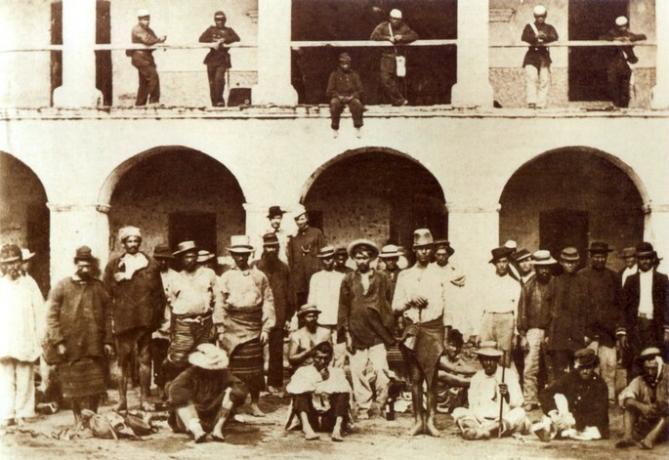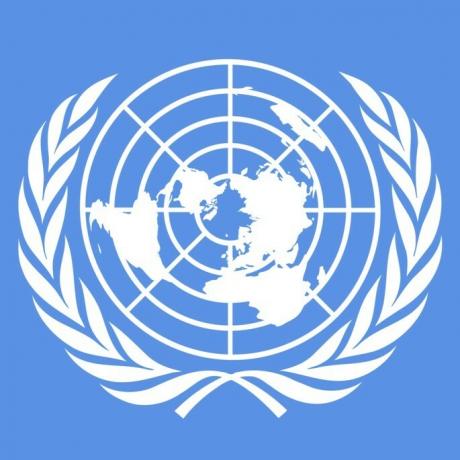THE independence of Brazil happened on the day September 7, 1822, and, through this event, the country achieved its emancipation from Portugal. That day happened the independence cry, performed on the banks of the Ipiranga River, in São Paulo, and given by Pedro de Alcântara (future D. Peter I). Brazilian independence was accompanied by small armed conflicts, located mainly in the Northeast.
Also access: Understand the coup that allowed D. Pedro II become emperor at 14 years old
Causes
The independence of Brazil was declared in 1822, but this event is directly related to the coming from the Portuguese royal family to Brazil, in 1808. The arrival of the Portuguese court to the colony happened due to the invasion of Portugal carried out by the troops Napoleonic, in 1807. At the time, Portugal had D. Mary as queen and D. John as Prince Regent.
The arrival of the royal family to Brazil resulted in deep transformations in the cultural, commercial and economic areas, and opened up a political process that resulted in the colony's independence. The first major measure decreed by D. John VI (he only actually became D. John VI in 1816) went to opening of Brazilian ports to friendly nations, and this allowed Brazilian traders to trade directly with English traders.
D. João VI also took a series of measures that encouraged the cultural development and modernization of Brazil, demonstrating the intention to make it a part of the Portuguese kingdom and not just a colony. This happened on December 16, 1815, when Brazil was raised to kingdom status. From then on, Portugal was renamed United Kingdom of Portugal, Brazil and Algarves.
The main objective of this was to keep the colonists satisfied with Portugal and prevent Brazil from following the path of revolution — as had happened in the US and England relationship. Despite the advances, the Portuguese presence in Brazil generated friction, and the symbolic case of these was the Pernambuco Revolution of 1817.
This revolution demonstrated local dissatisfaction with changes that took place after the arrival of the royal family in Brazil and was harshly repressed. Three years later, the problems came from Portugal when the Porto Liberal Revolution, in 1820. The events of the latter are what precipitated the independence process here.
Portugal faced a serious crisis due to the French invasion of the Napoleonic period. In the metropolis there was great dissatisfaction with the changes that were taking place in Brazil, especially with the economic freedom that the colony had conquered. The great demands made in the Porto Revolution were:
the king's return to Portugal;
the re-establishment of the commercial monopoly.
The second requirement, mainly, deeply bothered the colonists because it made clear the intentions of the Portuguese elite in perpetuate the bonds of colonial exploitation. As for the first requirement, it resulted in the return of D. João VI to Lisbon on April 26, 1821. His son, Pedro de Alcântara, remained in Brazil as ruler.
Also access: Discover the conflict that marked the reign of D. Peter I
Process
The process of independence in Brazil advanced and materialized during the regency of D. Peter. The Portuguese Cortes, a political institution that emerged with the Porto Revolution, took some measures that were quite unpopular in Brazil: the return of some institutions originated in the Joanine Period in Portugal, the sending of more troops to Brazil and the return of the prince regent to the European country.
The negotiations carried out between the Brazilian and Portuguese authorities were marked by the intransigence of the Portuguese and contributed to increase the resistance of Brazilians towards Portugal. This distance between Brazilians and Portuguese gave rise to the discourse of independence in Brazil, and it is important to emphasize that the Brazilians' initial desire was not separation.
When the Portuguese demanded the return of D. Pedro, the Brazilians reacted and created the Resistance Club, who delivered a document to D. Pedro, with thousands of signatures, demanding his stay in Brazil. Because of this reaction from the settlers, D. Pedro declared his stay in the country on January 9, 1822, in what is known as day of stay.
The events of the following months and the continuation of the intransigent and disrespectful position (in the colonists' view) are the factors that led Brazil to break with Portugal. In this process, D. Pedro was very influenced by two people: D. Maria Leopoldine, his wife, and José Bonifácio de Andrada e Silva, your advisor.
In May, the comply, which determined that the laws enacted in Portugal would only be valid in Brazil with the personal approval of D. Peter; and, in June, an election was called for the formation in Brazil of a National Constituent Assembly. In other words, the colonists showed an interest in drafting a Constitution.
The relationship between Brazilians and Portuguese continued to deteriorate, and on August 28, 1822, news arrived from Portugal. These, in fact, were orders, and the Portuguese Cortes demanded the immediate return of D. Peter to the metropolis. These orders also included the repeal of a series of measures in force in Brazil and classified by the Portuguese as “privileges”.
The orders were read by D. Maria Leopoldina, who called a extraordinary session on September 2, 1822 and signed a declaration of independence therein. Then he organized a message and sent it as a matter of urgency to D. Pedro, who was in São Paulo. The messenger sent was called Paulo Bregaro.
On this occasion, D. Pedro was close to the Ipiranga River and, according to official history, he gave the cry for independence after learning about the news sent by his wife. This event, however, does not have evidence that allows historians to prove it. After the declaration of independence, D. Peter went acclaimed emperor on October 12th and crowned on December 1st.
independence war
Brazil's independence it was not peaceful. After his news spread, a number of regions rebelled against the movement and remained loyal to the Portuguese. These movements of resistance to independence took place in the For, Bahia, Maranhão and Cisplatin (current Uruguay). The war of independence lasted until 1824 and ended with the defeat of those loyal to Portugal.
Also access: Discover the events that marked the First Reign
Consequences
The independence of Brazil was only recognized by the Portuguese in 1825, through an agreement between Brazil and Portugal and mediated by England. Among the consequences of this event, the following stand out:
expansion of the slave system according to the interests of Brazil's economic elite;
emergence of Brazil as a nation;
construction of the Brazilian as a nationality;
indebtedness of Brazil to pay an indemnity agreed with the Portuguese;
establishment of a monarchy (the only one in South America).
Summary of the Brazilian Independence process
The hallmark of Brazilian independence is the cry of the Ipiranga, which took place on September 7, 1822 and was carried out by d. Peter I.
From 1808, several changes were implemented in Brazil due to the transfer of the family Portuguese real to Rio de Janeiro, as the opening of ports and the elevation of Brazil to the status of Kingdom.
The Porto Liberal Revolution of 1820 started the process of separating Portugal from Brazil due to the divergence of existing interests.
After the return of d. João VI for Portugal, d. Pedro stayed in Brazil as Prince Regent.
The intransigence of the Portuguese in relation to the Brazilians contributed to the distance and strengthening of the independence movement.
On the Day of Fico, d. Pedro pledged to stay in Brazil.
After the cry for independence, there were wars of independence in some parts of Brazil.
D. Pedro was acclaimed and later crowned Emperor of Brazil, becoming d. Peter I and starting the First Reign.
*Image credits: Boris15 and Shutterstock
Take the opportunity to check out our video lesson related to the subject:



